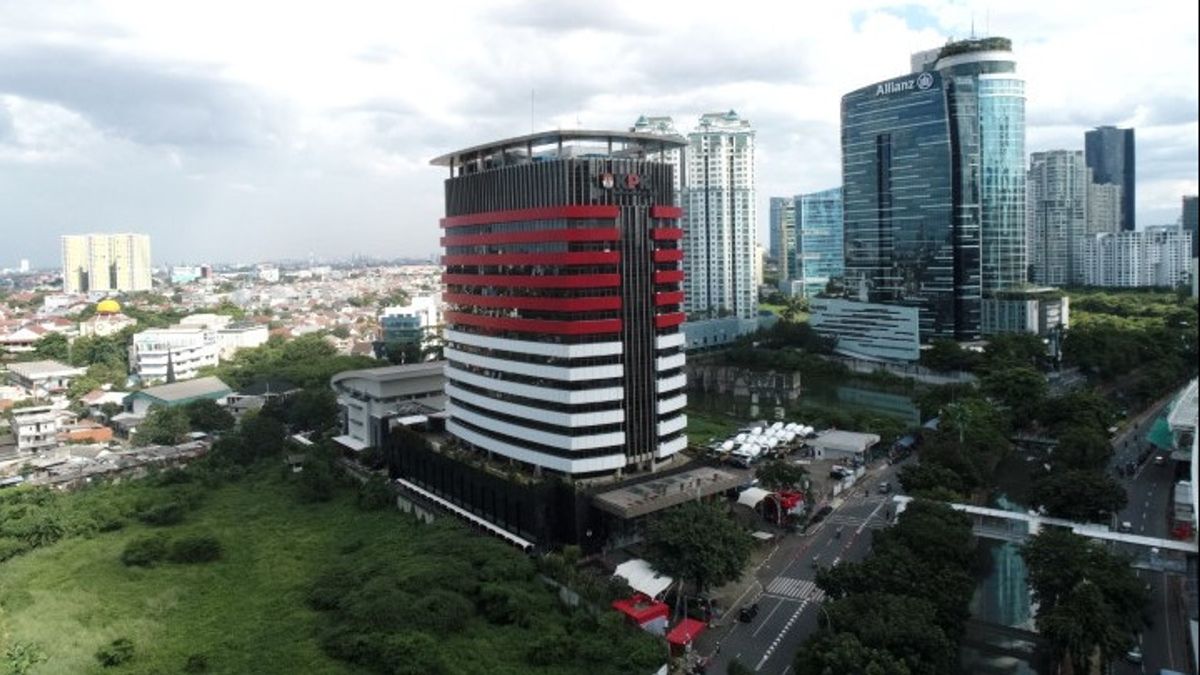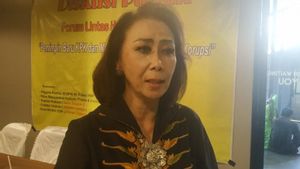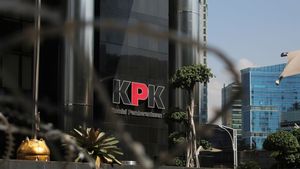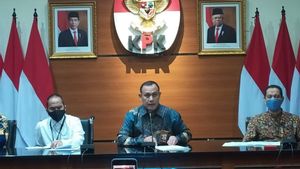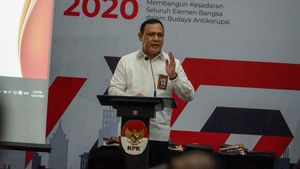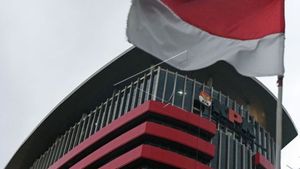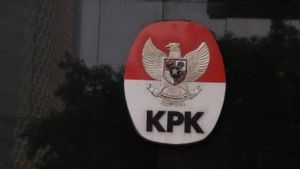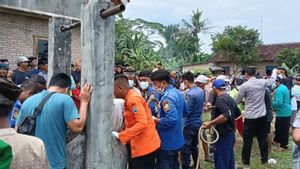JAKARTA - After polemics, the Corruption Eradication Commission (KPK) finally announced that 75 of its employees had not passed the National Insight Test (TWK) assessment. This assessment is a requirement for anti-gas commission employees to become the state civil apparatus (ASN) as mandated by the Corruption Eradication Commission Law Number 19 of 2019.
This announcement was made by KPK Chairman Firli Bahuri accompanied by KPK Deputy Chairman Nurul Ghufron, KPK Supervisory Board Indriyanto Seno Adji, and KPK Secretary-General Cahya H. Harefa.
"There are 75 employees who do not meet the requirements (TMS)," Firli said in a press conference held at the KPK's Red and White House, Kuningan Persada, South Jakarta, Wednesday, May 5.
However, the former Deputy for Corruption Eradication of the Corruption Eradication Commission (KPK) did not reveal which employees did not pass the selection. The reason is that the KPK upholds the enforcement of human rights and does not want this to have an impact on their families and the environment around them.
"We will convey the 75 names to the secretary-general after the decision letter is issued because we do not want to spread issues," he said.
Apart from refusing to disclose the names of the 75 employees who failed to become ASN, the KPK has not taken any stance against them. He conveyed this, as well as responding to the news that the KPK would fire a number of people, including senior investigator Novel Baswedan, who was said to have not passed the assessment.
"I want to say to this day the KPK has never said and confirmed there is a process of dismissal. The KPK has never spoken of dismissing people with disrespect, the KPK has never talked about dismissing its employees with respect. Nothing," he said.
This assessment was carried out on 1,351 KPK employees and as a result, 1,274 people passed the requirements, 75 did not meet the requirements, and two did not attend the interview test.
Furthermore, the KPK will submit the names of those who do not pass to the Ministry of Administrative and Reform (KemenPANRB) and the State Civil Service Agency (BKN). This is done based on the decision of the leadership meeting with stakeholders in the anti-graft commission.
"The KPK will coordinate with KemenPANRB and BKN regarding the follow-up of 75 employees who were declared TMS (not eligible)," said KPK Secretary-General Cahya H. Harefa in the same press conference.
He said, while there was no explanation from KemenPANRB and BKN, the KPK would not fire the 75 employees. "Until now, the Corruption Eradication Commission has never stated that it has dismissed an employee who is declared ineligible until a further decision is made in accordance with the legislation related to ASN," he said.
SEE ALSO:
Tjahjo questioned the handover of the fate of 75 KPK employees to his ministry
Minister of Administrative Reform and Bureaucratic Reform (MenPANRB) Tjahjo Kumolo opened his voice regarding the decision to dismiss 75 Corruption Eradication Commission (KPK) employees who did not pass the national insight test (TWK), returned to his party.
"How come it is returned to PAN-RB, what is the legal basis for this? This is an internal KPK household. I do not know, from the start this is an internal problem of the KPK," said Tjahjo to reporters, Wednesday, May 5.
He admits that he is confused about receiving the responsibility because he does not have a legal basis. According to him, since the beginning of the ASN selection exam, it was an internal problem of the KPK.
Not only that, he admitted that he did not know if the anti-graft commission would communicate with KemenPANRB.
Furthermore, Tjahjo explained that the ASN test for KPK employees was the full authority of the KPK leadership based on the regulations of the KPK commissioners. In the selection examination, the KPK cooperates with BKN and the results go directly to the head of the institution.
Thus, decisions regarding the results of TWK are in the hands of the KPK leadership, not left to the KemenPANRB.
"KemenPANRB does not participate in the KPK employee test process related to national interviews or according to the KPK commissioner regulations, this is the authority of the KPK leadership," he said.
"The basis for the KPK employee test is the regulation of the KPK KemenPANRB commissioner not to participate in the national insight test process, the collaboration between the KPK and BKN, the decision from the test interview team, the results are submitted to the KPK leadership, it is over," added the PDI-P politician.
The National Insights Test assessment was considered wrong from the start
The Save KPK Coalition criticized the policy of KPK Chairman Firli Bahuri, who was said to be the initiator of the National Insight Test (TWK) assessment. The coalition, which consists of a number of anti-corruption activists, including the Indonesia Corruption Watch (ICW), believes that Firli has an agenda to remove employees who are handling major cases involving ruling elements.
"This wrong move by the KPK Chairperson further adds to the grim record of the anti-graft agency under his command (Firli Bahuri, red)," said ICW researcher Kurnia Ramadhana who is also part of the coalition at a press conference before the KPK announced that 75 of its employees had not passed the selection.
He said Firli had to obey the rule of law and the Constitutional Court's decision which emphasized that the transfer of employment status should not be detrimental to the anti-graft commission employees.
Not only that, this coalition views that Firli's entry as KPK leader has a special agenda to weaken anti-graft institutions from within.
This is evident from the non-arrest of the former PDIP candidate who bribes the KPU commissioner, Harun Masiku; omission of names in the indictment for the COVID-19 social assistance corruption case; protect witnesses in the case of the lobster seed export license bribery case; to issue a BLBI SP3; and dozens of other controversies.
Kurnia said the KPK should not have carried out the test. Moreover, the Corruption Eradication Commission Regulation Number 1 of 2021 also contradicts Government Regulation Number 41 of 2020 which does not mention at all the stages of selection when a personnel transfer is carried out.
"We also ask to stop all forms of corruption by the Corruption Eradication Commission by eliminating employees who are recorded in history as figures who have integrity and are highly committed to eradicating corruption. Things like this should be exposed and investigated openly," he concluded.
The English, Chinese, Japanese, Arabic, and French versions are automatically generated by the AI. So there may still be inaccuracies in translating, please always see Indonesian as our main language. (system supported by DigitalSiber.id)
